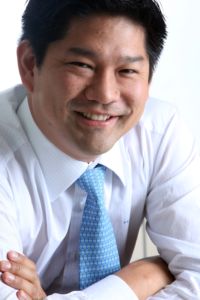CEO TIM Fiber, Brasil: “TIM believes in an unlimited experience.”
Rogerio Takayanagi is CEO of TIM Fiber, Brasil and is speaking on Day Three of the Broadband World Forum 2012, taking place on the 16 - 18 October 2012 at the RAI Exhibition and Convention Centre, Amsterdam, the Netherlands. Ahead of the show we speak to him about the current state of play for TIM Brasil, and where it will be focussing in the near future.
July 30, 2012


Rogerio Takayanagi Is Ceo Of Tim Fiber, Brasil
Rogerio Takayanagi is CEO of TIM Fiber, Brasil and is speaking on Day Three of the Broadband World Forum 2012, taking place on the 16 – 18 October 2012 at the RAI Exhibition and Convention Centre, Amsterdam, the Netherlands. Ahead of the show we speak to him about the current state of play for TIM Brasil, and where it will be focussing in the near future.
What were the big milestones for you in the last 12 months?
In the third quarter of 2011 TIM acquired AES Atimus, Brazil’s largest metropolitan fibre network with over 5,500km of cable, and able to reach approximately 8 million households in Brazil’s main economic centres of Rio de Janeiro and São Paulo. This investment was initially based on the necessity to expand TIM’s mobile network and support double digit traffic expansion. As a value option, TIM saw the extensive coverage of AES’s network as an opportunity to enter the fast growing market of the residential broadband. From the decision to launch the Usage Based Billing (UBB) service, TIM developed the entire BSS and OSS systems from scratch and prepared the network in just five months. The first client was activated in May this year.
There is often criticism that ISPs and governments are not rolling out networks that are fast enough – but we also hear that few customers are interested in paying for higher speeds? Do you see a demand and a need for faster speeds?
In Brazil, most of the customers with broadband access have a low performing service (over 70 per cent have less then 2Mb/s of bandwidth). In this market, the main players are incumbents that face challenges in offering higher internet speeds because of the length of the copper network and the investment required to upgrade to a Next Generation network.
The desire for speed and the natural demand that follows this has three main reasons. Firstly, the customer navigation profile shows that people want to watch high quality videos. Secondly, today’s customers also require a complete online experience, using multiple devices connected at the same time. Lastly, we have a growing online gaming market, video streaming, cloud computing and social media all presenting a real necessity for higher speeds. As a result, the Brazilian broadband market is growing at a double digit pace with altnets growing mostly thanks to offering higher speed connectivity.
Many see OTT services as a major threat? Do you?
OTT might be a major threat for incumbents but not for new players, like us. As the internet traffic grows, the incumbents need more investment, and the revenues of this growth are divided with OTTs. For new players, with underutilised networks, OTT might be seen as a partner, representing the reason to provide a superior broadband access service.
Where do you stand on bandwidth caps, line throttling and traffic management?
TIM believes in an unlimited experience. This has been one of the main reasons for our success in the past two years, and now, with our fixed broadband operation, we will stick with this idea of no bandwidth caps.
Could 4G services affect the demand for superfast fixed line broadband?
It may affect some markets, but not all. Although 4G can be as fast as fixed-line broadband, it will need a large investment as current cellular networks have physical limited capacity. For 4G clients to have the same internet experience as fixed broadband clients, operators need to invest in a large number of antennas and backhauling. It may happen in Japan or another country, but it won’t happen in markets such as Brazil.
Net neutrality has been enshrined in law in the Netherlands. What’s your stance on this issue?
We are working very hard to improve our customer’s experience. The idea is to invest in caching, CDN, direct peering, etc in order to improve the performance of our network in accessing the most popular content. We don’t think that degrading quality on specific content is the right approach but to improve the customer experience for the most popular content.
Do you think there is enough innovation in the industry? If so, can you provide examples?
Innovation is focused on value propositions, segmentation and disruptive offering models. These include plans that enable customers to maximise their internet experience, enabling them to enhance their lives. In the consumer segment these would be value added services such as digital home, video content, multi-device applications and services and in the business segment, vertical solutions such as e-health, e-government, e-education and security. Nevertheless, there are many opportunities for creating new solutions and maximising the roll-out of the mentioned innovations.
What would you say are the major challenges that you expect to face in the next few years?
In our case, as we are still in the start-up phase, execution is still our main focus of attention and quality of the user experience is the main aim. In particular, our priorities will be to work on the transport layer in order to bring content closer to the consumer, and with the OTT providers.
What are you hoping to get out of attending the Broadband World Forum 2012?
The most interesting output from BBWF is the networking and knowledge gained from sharing and the learning experiences with players from different background and competitive situations. This provides a useful insight into the innovation process as well as for our internet expansion plans.
The Broadband World Forum 2012 is taking place on the 16 – 18 October 2012 at the RAI Exhibition and Convention Centre, Amsterdam, the Netherlands. Click here now to register your interest.
Read more about:
DiscussionAbout the Author(s)
You May Also Like











_1.jpg?width=300&auto=webp&quality=80&disable=upscale)


.png?width=800&auto=webp&quality=80&disable=upscale)